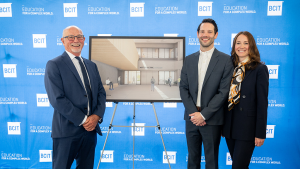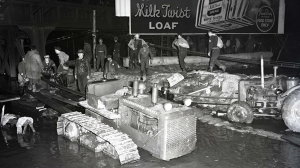The first 1.6 kilometres of twin tunnels for the Toronto-York Spadina Subway Extension (TYSSE) have been completed, it was recently announced.
TORONTO
The first 1.6 kilometres of twin tunnels for the Toronto-York Spadina Subway Extension (TYSSE) have been completed, it was recently announced.
The new tunnels represent one complete section of the twin tunnels that will connect the future Sheppard West and Finch West Stations. The tunnel boring machines (TBMs) named “Holey” and “Moley” bored the tunnels.
“Holey” broke through the headwall at the Keele Street extraction shaft on May 1, completing the first tunel for the project. “Moley” broke through on June 4, completing the second tunnel for this section.
The extraction shaft, where the TBMs arrived, is located in the centre of Keele Street, just south of Finch Avenue West.
Related:
Anchor Shoring and Caissons worker killed at Toronto construction site
York Region, Ontario approves subway construction expenditures
Both TBMs are now being dismantled and moved to the second launch site and will bore the next section of tunnel between Sheppard West Station and Downsview Station.
Four TBMs will be used to build a total of 13.4 kilometres of tunnels, or 6.7 kilometres of twin tunnels. TBMs can drill 15 metres a day.
The TYSSE project is an 8.6-kilometre extension of the Toronto Transit Commission’s Yonge-University-Spadina subway line from its present terminus at Downsview Station to the Vaughan Metropolitan Centre at Highway 7. It will have six new stations, including one at York University.
The expansion of the subway will bring the line into York Region, the fastest-growing region in the Greater Toronto Area over the past 10 years.
The TYSSE project is targeted for completion by the end of 2015.
The Greater Toronto and Hamilton Area is home to six million people and is expected to grow by about two million people over the next 20 years. The area currently ranks last for the longest commute times out of a survey of 40 North American cities.
Right now it is estimated that traffic congestion costs the regional economy about $6 billion on an annual basis.
“Improving public transit helps reduce congestion on our roads, protects our environment, and makes it easier for Ontarians to get to where they need to go,” said Ontario Minister of Infrastructure and Transportation Bob Chiarelli in a release.
Project contributors include: the Government of Canada with up to $697 million, the Province of Ontario with $870 million, the City of Toronto with $526 million and the Regional Municipality of York with $352 million.
DCN NEWS SERVICES










Recent Comments
comments for this post are closed